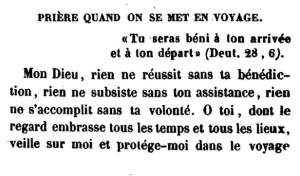Contributor(s): Shared on: Categories: Tags: | Source (Hebrew) | Translation (English) |
|---|
Prière quand on se met en voyage.
|
Prayer when you go on a journey. |
«Tu seras béni à (on arrivée
et à ton départ» (Deut. 28, 6).
|
“Blessed shall you be in your arrivals
and blessed shall you be in your departures.” (Deuteronomy 28:6) |
Mon Dieu, rien ne réussit sans ta bénédiction, rien ne subsiste sans ton assistance, rien ne s’accomplit sans ta volonté. O toi, dont le regard embrasse tous les temps et tous les lieux, veille sur moi et protége-moi dans le voyage que je vais entreprendre; détourne de mon chemin les dangers et les accidents; permets qu’après avoir atteint heureusement le but, je revienne en paix dans ma famille. Préserve aussi, mon Dieu, de toute calamité (mon père, ma mère, ma femme, mes enfants), et tous les miens, et fais qu’à mon retour je les retrouve dans la joie et la prospérité.
|
My God, nothing succeeds without your blessing, nothing subsists without your assistance, nothing is accomplished without your will. O you, whose gaze embraces all times and all places, watch over me and protect me in the journey I am about to undertake; divert dangers and accidents from my path; allow me, after having happily reached the goal, to return in peace to my family. Preserve also, my God, from every calamity (my father, my mother, my wife, my children), and all my people, and make that when I return I find them in joy and prosperity. |
Bénis mon entreprise, ô mon Père, ét place à mes côtés un ange protecteur, qui me guide avec amour et me ramène vers ceux que je vais quitter.
|
Bless my company, O Father, and place at my side a protective angel, who lovingly guides me and brings me back to those whom I am about to leave. |
Fortifié par cette espérance, je remets dans tes mains, Seigneur, mon âme et mon corps, et je ne crains plus rien; car tu es le protecteur tout-puissant d’Israël, et tu exauces la prière de tous ceux qui espèrent en toi.
|
Strengthened by this hope, I commend my soul and my body into your hands, O Lord, and fear no more; for you are the Almighty Protector of Israel, and you answer the prayer of all those who hope in you. |
Source(s)
 Jonas Ennery (Jan. 2, 1801, Nancy - May 19, 1863, Brussels) was a French deputy. He was for twenty-six years attached to the Jewish school of Strasbourg, of which he became the head. In collaboration with Hirth, he compiled a Dictionnaire Général de Géographie Universelle (4 vols., Strasburg, 1839–41), for which Cuvier wrote a preface. Soon afterward he published Le Sentier d'Israël, ou Bible des Jeunes Israélites (Paris, Metz, and Strasburg, 1843). At the request of the Société des Bons Livres he took part in the editorship of Prières d'un Cœur Israélite, which appeared in 1848. In 1849, despite anti-Jewish rioting in Alsace, Ennery was elected representative for the department of the Lower Rhine, and sat among the members of the "Mountain." He devoted his attention principally to scholastic questions. After the coup d'état he held to his socialist republican views and resisted the new order of things. For this, in 1852 he was exiled from France for life. He retired to Brussels, where he lived as a teacher until his death. Ennery's brother, Marchand Ennery, was the chief rabbi of Paris.  Arnaud Aron (March 11, 1807, in Sulz unterm Walde, Alsace – April 3, 1890), the Grand Rabbi of Strasbourg, began his Talmudic studies at an early age at Hagenau and continued them at Frankfort-on-the-Main. In 1830 he became rabbi of the small community of Hegenheim in Upper Alsace; and of Strasbourg in 1833. As he was under thirty, the age prescribed by law, he required a special dispensation to qualify for the office. In Strasbourg, Aron acquired the reputation of an eloquent and inspiring preacher and a zealous communal worker. He assisted in founding the School of Arts and Trades and took active interest in other useful institutions. In 1855 he convened an assembly of the rabbis of the department of the Lower Rhine for the consideration of religious questions. Aron was the author of the catechism used for confirmation as prescribed by the Consistory of Lower Alsace. In 1866 the French government acknowledged his services by appointing him a Knight of the Legion of Honor. In 1870, while Strasbourg was besieged, it was he, together with the archbishop, who raised the white flag on the cathedral. Subsequently he was decorated by the German emperor. Aharon Varady (M.A.J.Ed./JTSA Davidson) is a volunteer translator for the Open Siddur Project. If you find any mistakes in his translations, please let him know. Shgiyot mi yavin; Ministarot Naqeni שְׁגִיאוֹת מִי־יָבִין; מִנִּסְתָּרוֹת נַקֵּנִי "Who can know all one's flaws? From hidden errors, correct me" (Psalms 19:13). If you'd like to directly support his work, please consider donating via his Patreon account. (Varady also transcribes prayers and contributes his own original work besides serving as the primary shammes for the Open Siddur Project and its website, opensiddur.org.) Read a comment / Leave a comment (moderated) Works of related interest: |












Leave a Reply